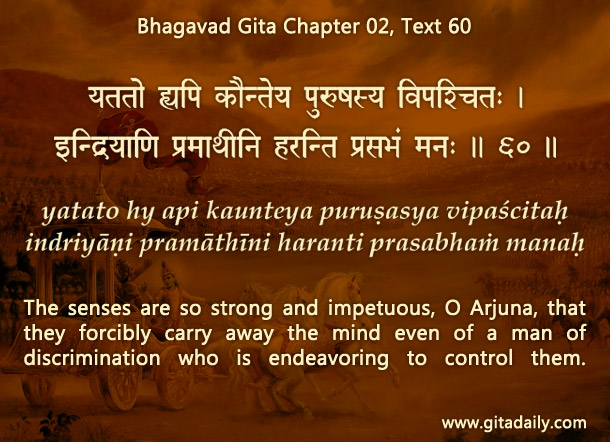How can we assess our progress toward self-transformation? By noting the process we go through before making choices, both healthy and unhealthy. If we identify our mind as the prompter of unhealthy choices and our intelligence as the prompter of healthy choices, let’s overview four broad stages.
Failure without struggle: At this stage, our mind proposes unhealthy choices and our intelligence goes along with it. That’s why there’s no inner struggle. Sometimes, the intelligence goes along passively and in some worse cases, the intelligence connives to implement the mind’s plans. Pointing to this dreadful stage, the Bhagavad-gita (03.40) warns that self-destructive desire can occupy even our intelligence — not just our mind.
Failure after struggle: At this stage, our intelligence is strong enough to object to, but not reject, the mind’s unhealthy choices. That’s why we end up making unhealthy choices despite striving to avoid them. Pointing to this stage, the Gita (02.60) cautions that the mind’s formidable force can overpower the intelligence.
Success after struggle: At this stage, our intelligence has become strong enough to say no to the mind, but the mind refuses to go down without a fight. That’s why we struggle before making a healthy choice. Pointing to this stage, the Gita (18.37) states that we have to go through poison before we can reach nectar.
Success without struggle: At this stage, our mind has become converted, having been purged of self-destructive impressions. Thus, it goes along with the intelligence toward healthy choices or even instinctively goes toward such choices even before the intelligence deliberates and determines that it is a healthy choice. Pointing to this joyful stage, the Gita (05.21) states that we naturally abstain from unhealthy choices and delight in healthy choices.
One-sentence summary:
To assess our progress toward self-transformation, note our response to healthy choices: do we encounter failure without struggle or failure after struggle or success after struggle or success without struggle?
Think it over:
- In making healthy choices, why may we fail without struggling?
- In making healthy choices, what determines whether we fail or succeed after struggling?
- In making healthy choices, when can we succeed without struggling?
***
02.60: The senses are so strong and impetuous, O Arjuna, that they forcibly carry away the mind even of a man of discrimination who is endeavoring to control them.
To know more about this verse, please click on the image


Very Encouraging.
Senses annihilates the MIND